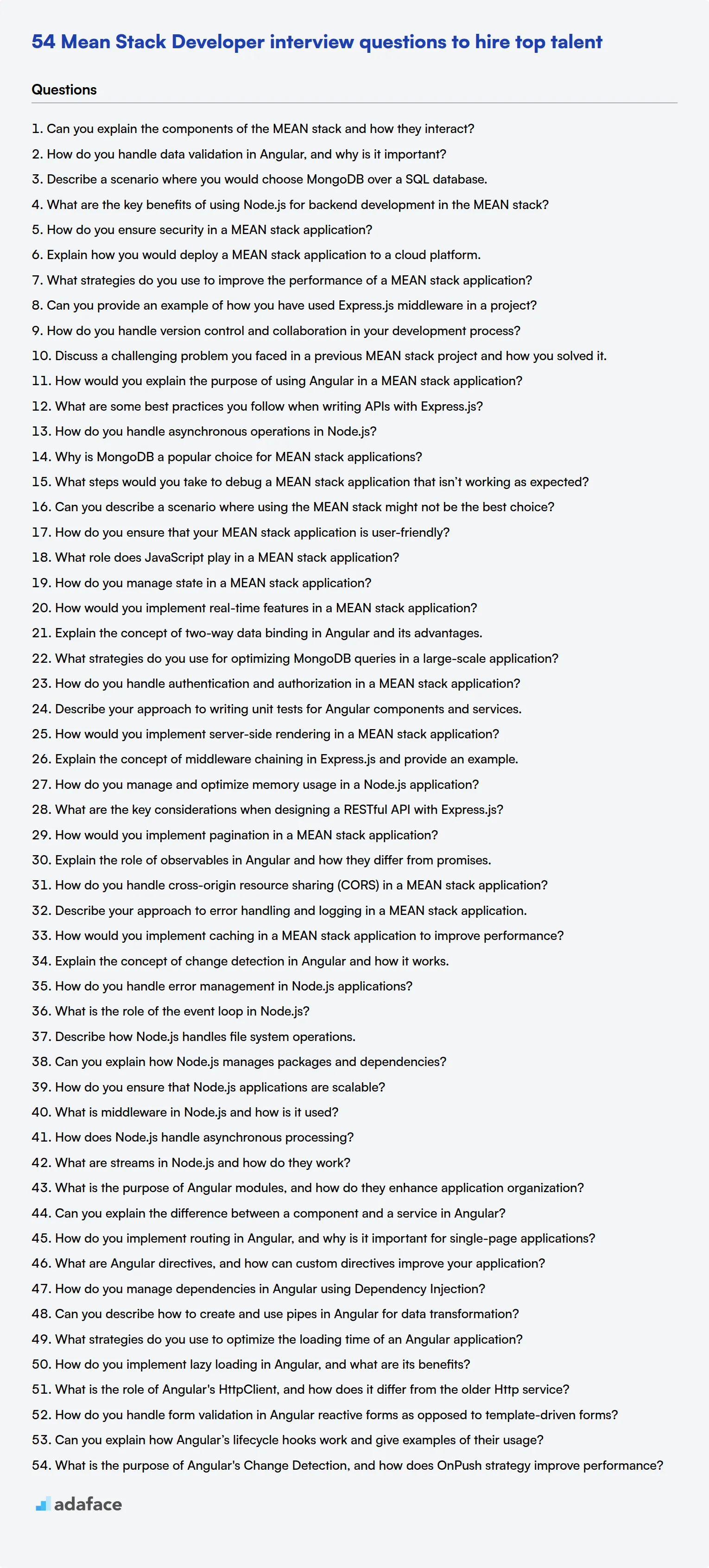Assessing the expertise of potential Mean Stack Developer candidates can be an arduous task, especially for recruiters seeking to ensure that applicants possess a comprehensive understanding of technologies like MongoDB, Express.js, Angular, and Node.js. A precise set of interview questions helps in revealing the applicant's skill depth and compatibility with development roles, as highlighted in the skills required for Mean Stack developers.
This blog post compiles a range of Mean Stack Developer interview questions, categorized to suit interviews for juniors, mid-tier developers, and those focusing on particular areas like Node.js functionalities and Angular processes. With organized lists, interviewers can streamline their assessments and make informed hiring decisions.
By incorporating these questions into your hiring process, you can significantly enhance your candidate evaluation efficiency. For more thorough pre-interview assessments, consider using Adaface's MEAN Stack developer test, ensuring only qualified candidates advance to interviews.
Table of contents
10 Mean Stack Developer interview questions to initiate the interview
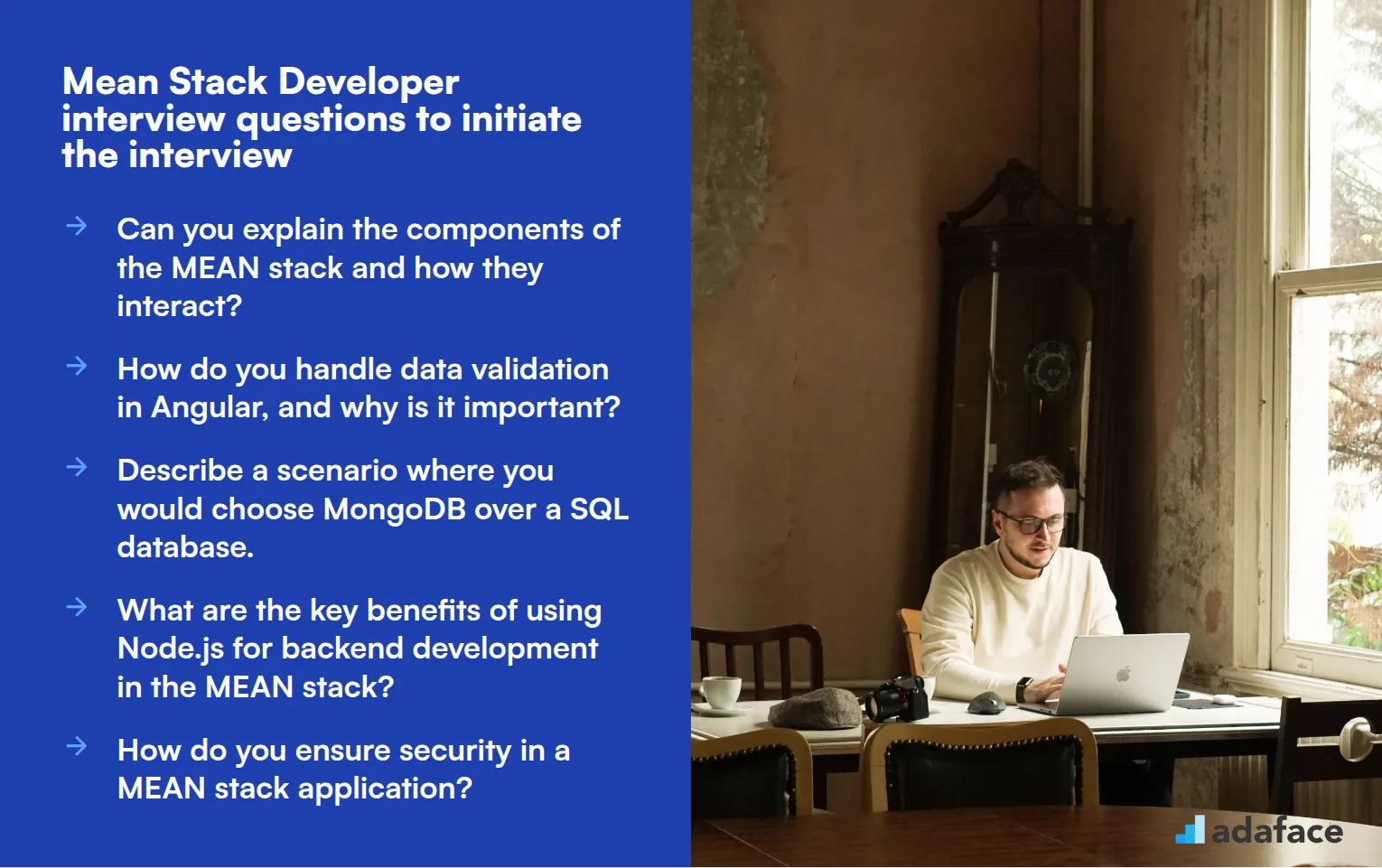
To effectively assess the expertise of candidates in the realm of MEAN stack development, consider these targeted interview questions. These queries are crafted to provide insights into their technical proficiency and practical experience, ensuring you identify the right fit for your development team.
- Can you explain the components of the MEAN stack and how they interact?
- How do you handle data validation in Angular, and why is it important?
- Describe a scenario where you would choose MongoDB over a SQL database.
- What are the key benefits of using Node.js for backend development in the MEAN stack?
- How do you ensure security in a MEAN stack application?
- Explain how you would deploy a MEAN stack application to a cloud platform.
- What strategies do you use to improve the performance of a MEAN stack application?
- Can you provide an example of how you have used Express.js middleware in a project?
- How do you handle version control and collaboration in your development process?
- Discuss a challenging problem you faced in a previous MEAN stack project and how you solved it.
9 Mean Stack Developer interview questions and answers to evaluate junior developers
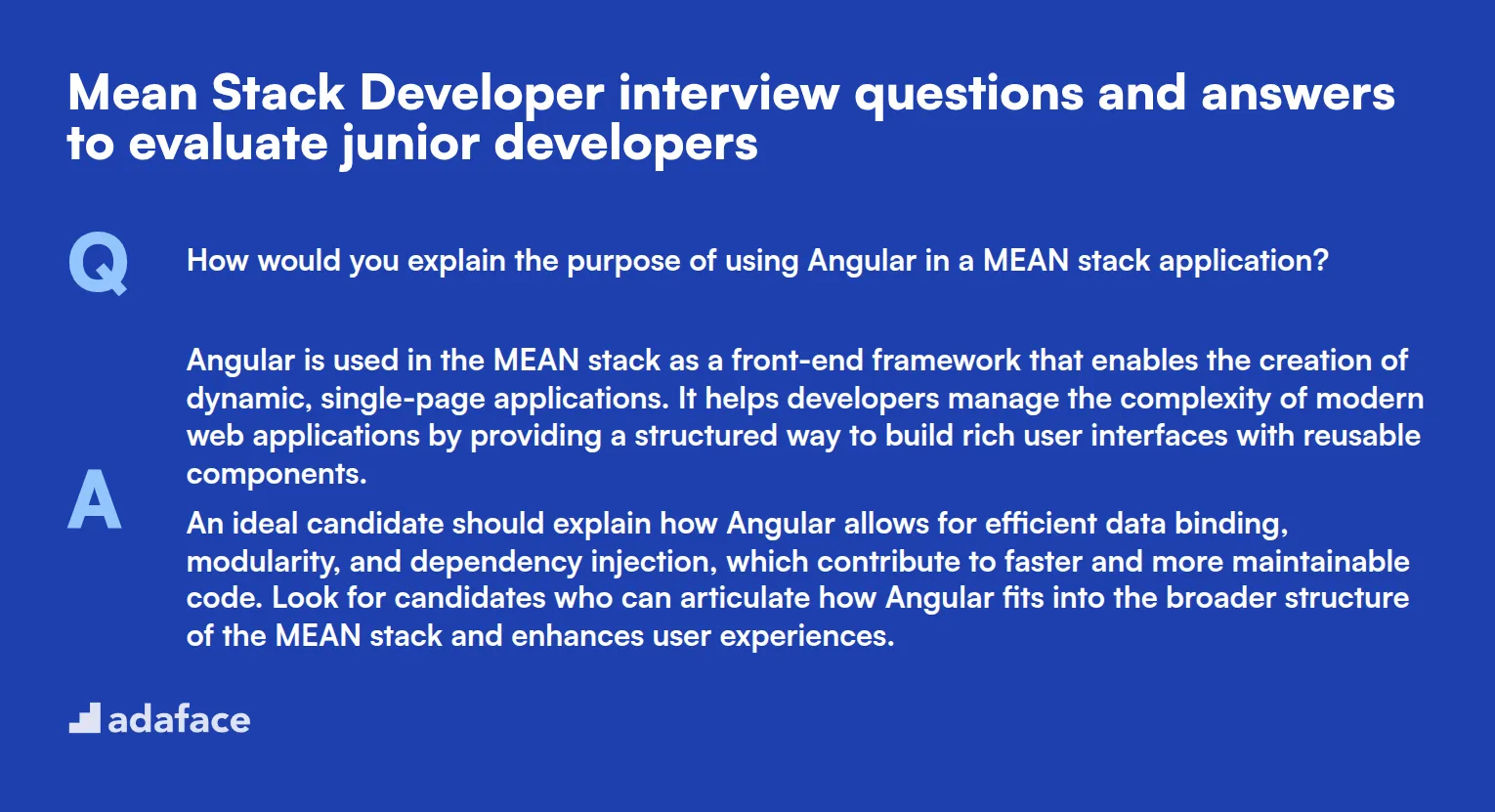
To gauge whether candidates can successfully navigate the world of MEAN stack development, consider this essential list of interview questions. These questions will help you identify the technical savvy and problem-solving prowess of junior developers, ensuring that your next hire is a perfect fit for your team.
1. How would you explain the purpose of using Angular in a MEAN stack application?
Angular is used in the MEAN stack as a front-end framework that enables the creation of dynamic, single-page applications. It helps developers manage the complexity of modern web applications by providing a structured way to build rich user interfaces with reusable components.
An ideal candidate should explain how Angular allows for efficient data binding, modularity, and dependency injection, which contribute to faster and more maintainable code. Look for candidates who can articulate how Angular fits into the broader structure of the MEAN stack and enhances user experiences.
2. What are some best practices you follow when writing APIs with Express.js?
Writing APIs with Express.js involves several best practices to ensure security, scalability, and maintainability. Some key practices include keeping routes and controllers separate for cleaner code, using middleware for logging, authentication, and error handling, and validating incoming data to prevent security vulnerabilities.
Candidates should also mention the importance of using RESTful principles and maintaining consistency in API design. Strong candidates will demonstrate a solid understanding of these practices and provide examples of how they've applied them in past projects.
3. How do you handle asynchronous operations in Node.js?
Node.js handles asynchronous operations using callbacks, promises, and the newer async/await syntax. Callbacks are functions passed as arguments to other functions, executed once the asynchronous operation completes. Promises provide a more elegant way to manage asynchronous code by avoiding callback hell, while async/await allows for writing asynchronous code that looks synchronous.
The ideal candidate should demonstrate an understanding of when and how to use each of these methods, providing examples of how they've managed asynchronous tasks in their projects. Look for clarity in explanation and understanding of error handling in asynchronous operations.
4. Why is MongoDB a popular choice for MEAN stack applications?
MongoDB is a popular choice for MEAN stack applications due to its flexibility as a NoSQL database, allowing for easy storage and retrieval of data in JSON-like documents. This aligns well with JavaScript-based applications and enables developers to work with data in a more natural way.
Candidates should highlight MongoDB's scalability, ease of use, and its ability to handle large volumes of unstructured data efficiently. An ideal response will also mention MongoDB's integration capabilities with other components of the MEAN stack.
5. What steps would you take to debug a MEAN stack application that isn’t working as expected?
Debugging a MEAN stack application involves a systematic approach to identify and resolve issues. Steps include checking the server logs for errors, using debugging tools like Chrome DevTools for client-side issues, and employing Node.js debugging features for server-side code.
Candidates should emphasize the importance of isolating the problem to a specific part of the stack and using unit tests to identify failing components. A strong candidate will also discuss their problem-solving approach and how they keep track of bugs and fixes.
6. Can you describe a scenario where using the MEAN stack might not be the best choice?
While the MEAN stack offers many advantages, it may not be the best choice for applications that require complex server-side logic, heavy computational tasks, or integration with legacy systems that are not compatible with JavaScript.
Candidates should be able to discuss the limitations of the MEAN stack in terms of performance and compatibility. Look for a nuanced understanding of when another stack might be more appropriate and why.
7. How do you ensure that your MEAN stack application is user-friendly?
Ensuring a MEAN stack application is user-friendly involves focusing on intuitive user interfaces, ensuring fast load times, and providing responsive design for various devices. Angular's component-based architecture can help in creating modular, reusable, and testable UI components.
An ideal candidate will also mention the importance of user testing and feedback to refine the application. Look for examples of how they have improved user experience in past projects and their commitment to continuous improvement.
8. What role does JavaScript play in a MEAN stack application?
JavaScript is the backbone of the MEAN stack, used across all layers of the stack: MongoDB for querying data in a JSON-like format, Express.js for server-side logic, Angular for front-end development, and Node.js for executing server-side code.
Candidates should demonstrate an understanding of JavaScript's versatility and its role in creating a seamless development experience across the stack. Look for explanations of how this uniformity helps in rapid development and easier debugging.
9. How do you manage state in a MEAN stack application?
Managing state in a MEAN stack application can be handled through Angular services for client-side state and using databases like MongoDB for persistent server-side state. Angular services provide a way to share data between components, while server-side state management involves ensuring data consistency and integrity.
Candidates should discuss strategies for state synchronization between client and server, and how they handle state transitions. Strong responses will include examples of state management techniques used in past projects and their impact on application performance.
15 intermediate Mean Stack Developer interview questions and answers to ask mid-tier developers.
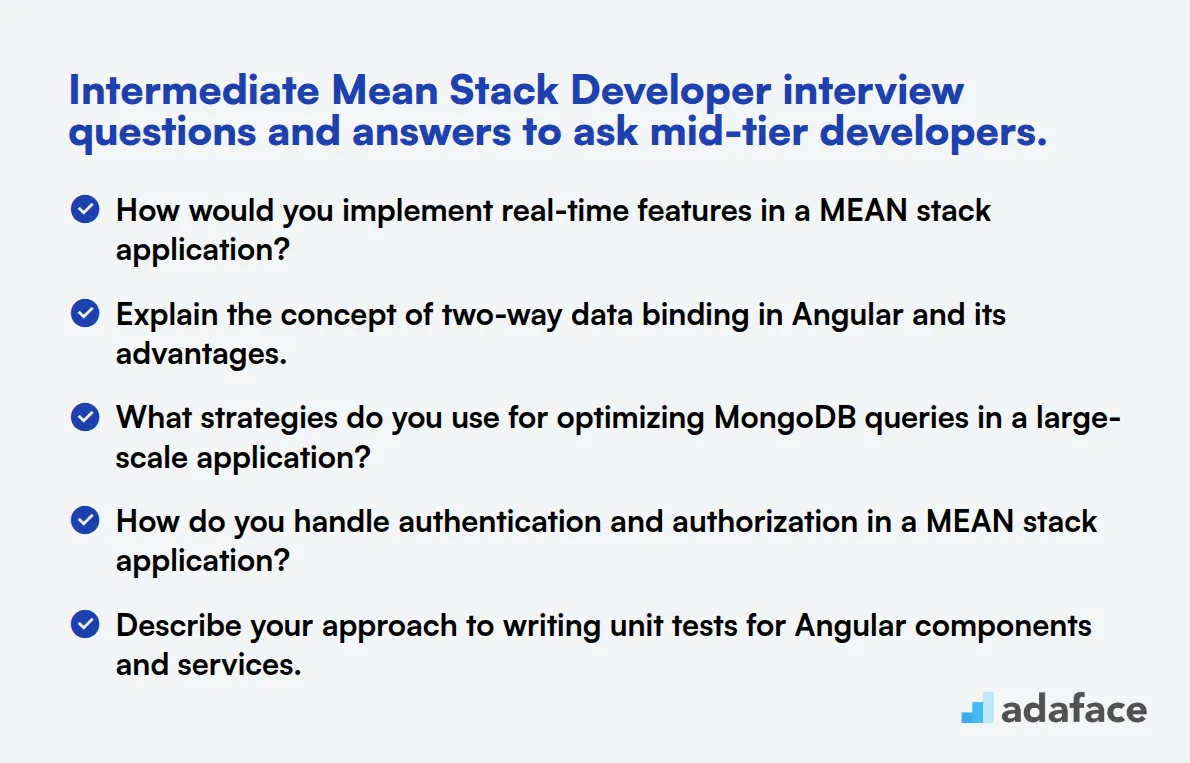
To assess the proficiency of mid-tier MEAN stack developers, use these intermediate-level interview questions. They'll help you gauge candidates' understanding of complex MEAN stack concepts and their ability to solve real-world development challenges.
- How would you implement real-time features in a MEAN stack application?
- Explain the concept of two-way data binding in Angular and its advantages.
- What strategies do you use for optimizing MongoDB queries in a large-scale application?
- How do you handle authentication and authorization in a MEAN stack application?
- Describe your approach to writing unit tests for Angular components and services.
- How would you implement server-side rendering in a MEAN stack application?
- Explain the concept of middleware chaining in Express.js and provide an example.
- How do you manage and optimize memory usage in a Node.js application?
- What are the key considerations when designing a RESTful API with Express.js?
- How would you implement pagination in a MEAN stack application?
- Explain the role of observables in Angular and how they differ from promises.
- How do you handle cross-origin resource sharing (CORS) in a MEAN stack application?
- Describe your approach to error handling and logging in a MEAN stack application.
- How would you implement caching in a MEAN stack application to improve performance?
- Explain the concept of change detection in Angular and how it works.
8 Mean Stack Developer interview questions and answers related to Node.js functionalities
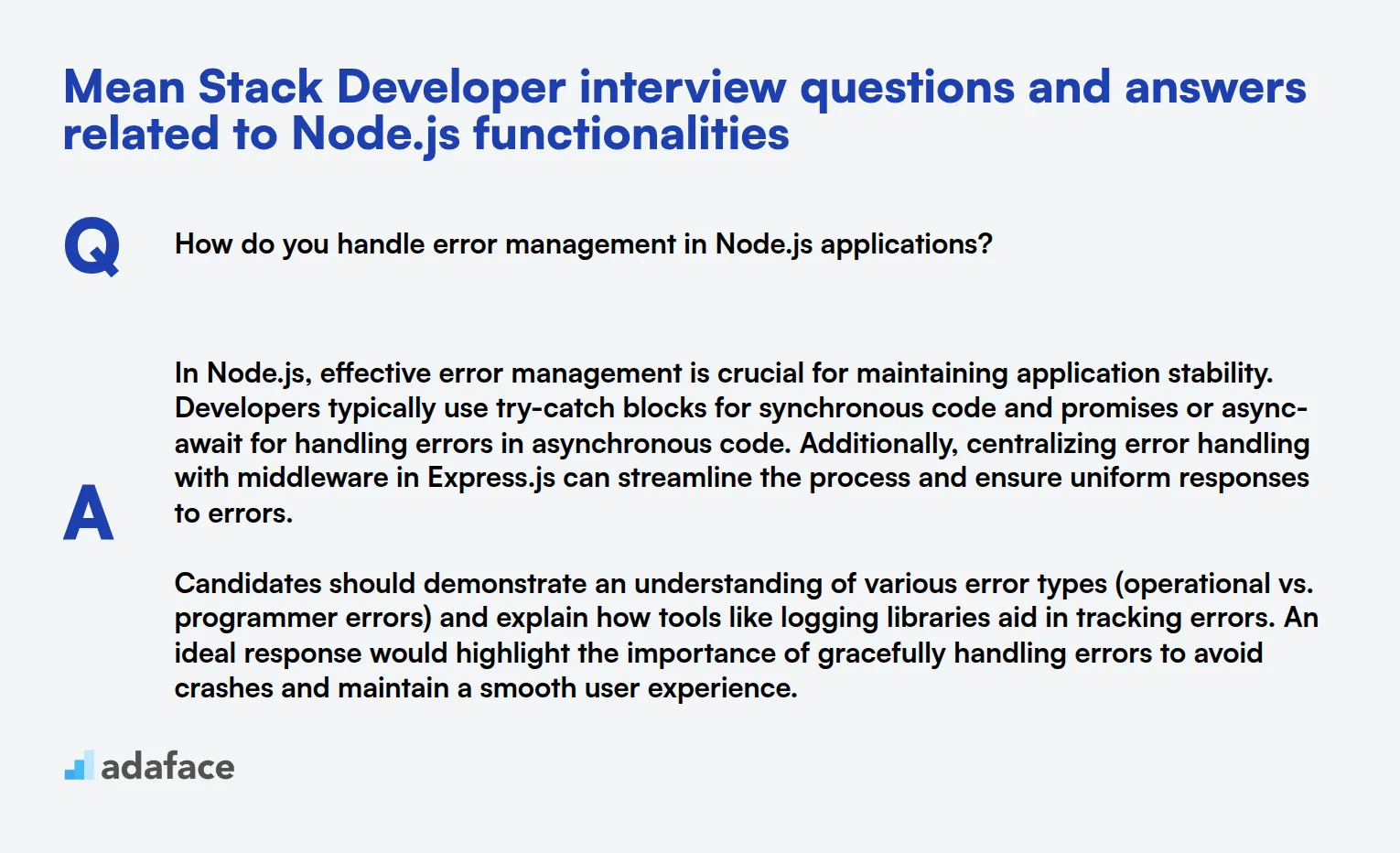
Dive into the world of Node.js with these interview questions, perfect for grilling prospective Mean Stack Developers on their backend prowess. This list, sprinkled with just the right amount of challenge, will help you unearth whether your candidate can handle the asynchronous dance of Node.js like a pro.
1. How do you handle error management in Node.js applications?
In Node.js, effective error management is crucial for maintaining application stability. Developers typically use try-catch blocks for synchronous code and promises or async-await for handling errors in asynchronous code. Additionally, centralizing error handling with middleware in Express.js can streamline the process and ensure uniform responses to errors.
Candidates should demonstrate an understanding of various error types (operational vs. programmer errors) and explain how tools like logging libraries aid in tracking errors. An ideal response would highlight the importance of gracefully handling errors to avoid crashes and maintain a smooth user experience.
2. What is the role of the event loop in Node.js?
The event loop is the heart of Node.js, enabling non-blocking I/O operations by offloading tasks to the operating system while letting Node.js handle other requests. It efficiently manages multiple operations by queuing them and executing them asynchronously, which is why Node.js is known for its performance in handling concurrent connections.
A strong candidate will explain how the event loop works with the call stack, callback queue, and the event queue. Look for insights on how this mechanism helps Node.js applications handle thousands of simultaneous connections without being bogged down by traditional multi-threading complications.
3. Describe how Node.js handles file system operations.
Node.js provides a built-in fs module to perform file system operations. It allows developers to read, write, update, and delete files either asynchronously or synchronously, depending on the method used. Asynchronous methods are preferred for better performance and non-blocking execution.
An ideal candidate should outline scenarios where synchronous file operations might be appropriate, such as during startup configurations, while emphasizing the benefits of asynchronous operations in a production environment. They should also discuss error handling when working with file systems.
4. Can you explain how Node.js manages packages and dependencies?
Node.js uses npm (Node Package Manager) to manage packages and dependencies. npm allows developers to install, update, and remove packages from their projects. It also manages version control for these packages, ensuring that the correct versions are used during development and production.
Candidates should discuss how package.json is crucial for tracking project dependencies and how npm scripts can streamline development tasks. Look for an understanding of semantic versioning and its role in managing dependency versions effectively.
5. How do you ensure that Node.js applications are scalable?
Scalability in Node.js applications can be achieved through several strategies, such as clustering, which involves creating multiple instances of a Node.js process, and using load balancers to distribute client requests across these instances. Employing microservices architecture can also enhance scalability by breaking applications into smaller, manageable services.
An ideal response would demonstrate knowledge of scaling horizontally and vertically, discussing the trade-offs involved. Candidates should mention tools and techniques like Docker for containerization and Kubernetes for orchestration, which aid in scaling applications efficiently.
6. What is middleware in Node.js and how is it used?
In Node.js, particularly with Express.js, middleware functions are used to handle requests, process them, and send responses. They are functions that have access to the request object, response object, and the next function in the application's request-response cycle.
Candidates should explain how middleware can be used for various purposes like logging, authentication, and error handling. An ideal answer would include insights on how middleware enhances modularity and reusability in application architecture.
7. How does Node.js handle asynchronous processing?
Node.js handles asynchronous processing through callbacks, promises, and async-await constructs. Callbacks are the most basic form of handling asynchronous code, while promises and async-await provide more readable and manageable code structures, especially for complex operations.
Candidates should discuss the evolution from callbacks to promises and async-await, highlighting how each method improves code readability and error handling. A keen understanding of how these constructs work under the hood will indicate a solid grasp of Node.js's asynchronous nature.
8. What are streams in Node.js and how do they work?
Streams are abstract interfaces in Node.js used for working with streaming data. They allow processing of data piece by piece, which is ideal for handling large files or data that is being transferred over a network. Streams can be readable, writable, or duplex (both readable and writable).
An ideal candidate should explain the benefits of using streams, such as reduced memory consumption and increased performance for I/O operations. They should also mention practical applications of streams, such as file upload and processing large data sets efficiently.
12 Mean Stack Developer interview questions about Angular processes
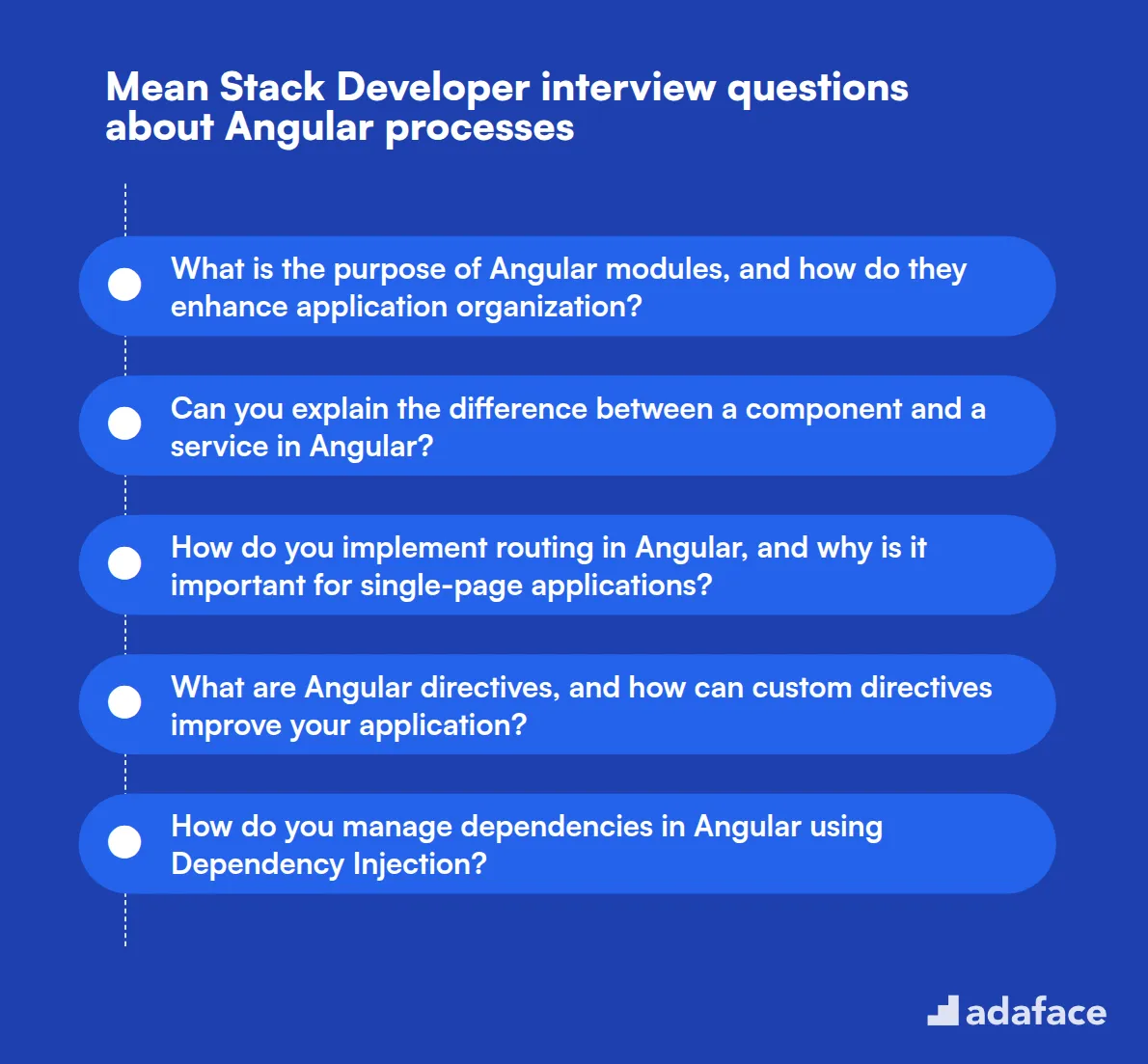
To assess the specific technical skills and processes that Angular developers utilize within the MEAN stack, consider asking these important interview questions. This will help you gauge their ability to effectively manage Angular-related tasks in your projects, ensuring a smooth development workflow. For a comprehensive overview, you can also check our mean stack developer job description.
- What is the purpose of Angular modules, and how do they enhance application organization?
- Can you explain the difference between a component and a service in Angular?
- How do you implement routing in Angular, and why is it important for single-page applications?
- What are Angular directives, and how can custom directives improve your application?
- How do you manage dependencies in Angular using Dependency Injection?
- Can you describe how to create and use pipes in Angular for data transformation?
- What strategies do you use to optimize the loading time of an Angular application?
- How do you implement lazy loading in Angular, and what are its benefits?
- What is the role of Angular's HttpClient, and how does it differ from the older Http service?
- How do you handle form validation in Angular reactive forms as opposed to template-driven forms?
- Can you explain how Angular’s lifecycle hooks work and give examples of their usage?
- What is the purpose of Angular's Change Detection, and how does OnPush strategy improve performance?
Which Mean Stack Developer skills should you evaluate during the interview phase?
While it's impossible to assess every aspect of a candidate's abilities in a single interview, focusing on core MEAN Stack Developer skills is crucial. Here are the key areas to evaluate during the interview process:
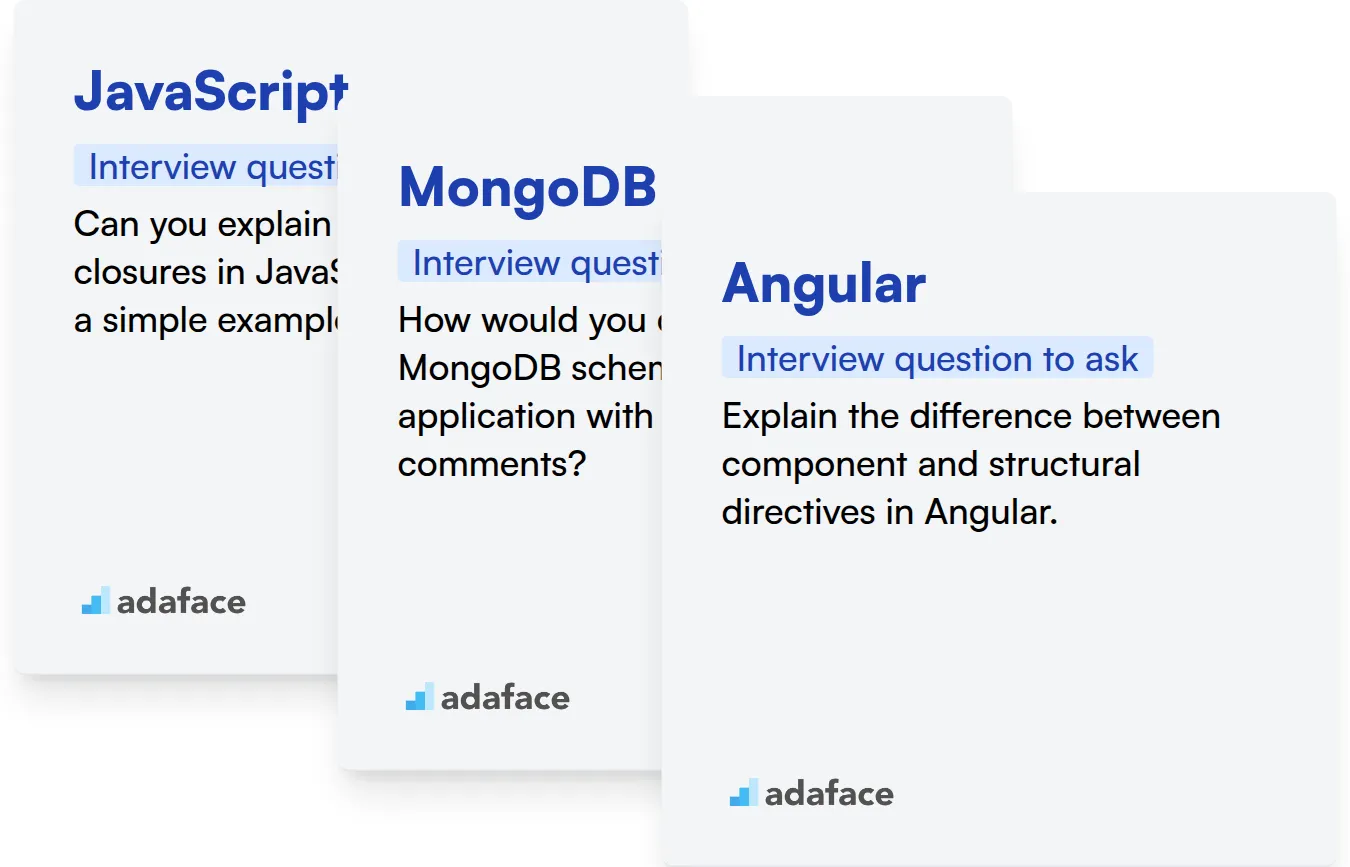
JavaScript
JavaScript is the backbone of MEAN Stack development. It's used across all layers of the stack, making it essential for developers to have strong JavaScript skills.
Consider using a JavaScript assessment test with relevant MCQs to filter candidates based on their JavaScript proficiency.
During the interview, ask targeted questions to gauge the candidate's JavaScript expertise. Here's an example:
Can you explain the concept of closures in JavaScript and provide a simple example?
Look for answers that demonstrate understanding of lexical scoping and the ability to create private variables. A good response should include a practical example showcasing closure usage.
MongoDB
MongoDB is the database component of the MEAN stack. Developers should be familiar with NoSQL concepts and MongoDB's document-oriented structure.
Use a MongoDB-specific assessment to evaluate candidates' knowledge of database operations and querying.
To assess MongoDB skills during the interview, consider asking:
How would you design a MongoDB schema for a blog application with posts and comments?
Look for responses that show understanding of document embedding vs referencing, consideration of read/write patterns, and awareness of MongoDB's flexible schema design.
Angular
Angular is the frontend framework in MEAN stack. Developers should be proficient in building responsive and dynamic user interfaces using Angular.
An Angular online test can help assess candidates' knowledge of components, services, and Angular-specific concepts.
To evaluate Angular skills in the interview, you might ask:
Explain the difference between component and structural directives in Angular.
Look for answers that clearly distinguish between the two types of directives, with examples of each and their use cases in Angular applications.
3 Tips for Using Mean Stack Developer Interview Questions
Before you start applying what you've learned, here are a few tips to optimize your interview process.
1. Implement Skill Assessments Prior to Interviews
Skill tests offer a practical means to evaluate candidates before the interview stage, ensuring that only those with relevant technical abilities make it to your interview list. Utilizing these assessments can significantly streamline the hiring process, as they provide a clear understanding of each candidate's proficiency.
For assessing Mean Stack Developers, consider using the full-stack developer test to evaluate their overall web development capabilities. Additionally, specific tests for Node.js, Angular, and MongoDB can help gauge their expertise in essential areas.
By employing these tests, you can filter candidates effectively and focus your time on those who demonstrate the necessary skills. This approach allows you to create a more informed dialogue during interviews, leading to better hiring decisions.
2. Curate Relevant Interview Questions
Time is limited during interviews, so it's vital to select targeted questions that cover the most important skills and attributes for the role. Prioritizing quality over quantity ensures that you can assess candidates effectively on critical aspects of the Mean Stack Developer position.
Consider adding questions related to problem-solving, teamwork, and adaptability, as these soft skills are often as valuable as technical expertise. Relevant questions might include those found in our soft skills interview questions or other technical areas like JavaScript and Node.js.
By narrowing down your question list to those that matter most, you can maximize your ability to assess candidates accurately and efficiently.
3. Leverage Follow-Up Questions
Simply asking the initial interview questions may not provide a complete view of a candidate's abilities. Follow-up questions are essential to dig deeper and clarify responses, helping you identify candidates who truly understand key concepts versus those who may just be giving surface-level answers.
For instance, if a candidate says they have experience with MongoDB, a good follow-up question could be, 'Can you explain how you would optimize a query in MongoDB?' This follow-up indicates not just familiarity, but depth of knowledge, allowing you to assess their problem-solving approach.
Find and evaluate Mean Stack Developers using the right interview questions and skills tests
If you are looking to hire someone with Mean Stack development skills, it's crucial to verify their expertise accurately. The most efficient way to do this is by utilizing skill tests like the Full Stack Developer Test or the Node.js Test.
Once you have employed these tests, you can effectively shortlist the best applicants for interviews. To get started, you can sign up here and explore our comprehensive range of assessments tailored for developers.
Full Stack Developer Test
Download Mean Stack Developer interview questions template in multiple formats
Mean Stack Developer Interview Questions FAQs
A Mean Stack Developer should be proficient in MongoDB, Express.js, Angular, and Node.js, along with JavaScript, HTML, and CSS.
Evaluate junior developers by asking basic questions about each component of the MEAN stack and assessing their problem-solving skills.
Advanced topics include RESTful API design, database optimization, Angular performance tuning, and Node.js security practices.
Ask about previous projects, challenges faced, and solutions implemented. Consider including a coding exercise or take-home assignment.

40 min skill tests.
No trick questions.
Accurate shortlisting.
We make it easy for you to find the best candidates in your pipeline with a 40 min skills test.
Try for freeRelated posts
Free resources




